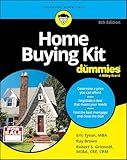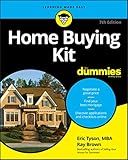Best Guides to Buy in February 2026

First-Time Home Buyer: The Complete Playbook to Avoiding Rookie Mistakes



Home Sweet Home a Step-By-Step Guide for First Time Home Buyers: Empowering Tips, Strategies and Checklists to Simplify Your Path to Homeownership



Home Buying Kit For Dummies



NO-STRESS HOME BUYING GUIDE: Everything You Need to Know to Buy Your First Home with Confidence (Calypso Keys: Real Estate Made Simple)



Home Buying Kit For Dummies



Home Buying 101: From Mortgages and the MLS to Making the Offer and Moving In, Your Essential Guide to Buying Your First Home (Adams 101 Series)



The Ultimate Guide to Buying Your Home


There's a first time for everything, right? And, almost every one of those first times can be a little daunting at first. But, buying your first home doesn't have to be one of those emotional roller coasters. Here's an easy step-by-step guide that will walk you through the entire process.
Get Your Finances in Order
If you haven't viewed your credit report in awhile, now is the time to take a good look at it. Not only will you see your overall credit score, but most of your financial activity is monitored by credit reporting bureaus, so all of the timely payments that you have been making will be reflected in your credit report. Any negative information will also be listed, which is why you want to look at it first, before you begin talking to lenders, to give you a chance to clean up anything that is hurting your credit score. You'll also want to make sure that you have the down payment to buy a home, and that it's clearly earmarked for the lender to see.
Get Pre-Approved for a Mortgage
Now, it's time to talk to some lenders. While you do want to shop around for the best lender, it's important to remember that your credit score can be affected by too many inquiries within a certain time frame. And, your credit worthiness will dictate the financial terms of the mortgage that you are seeking. So, it's a good idea to limit how many financial institutions you are talking to about home loans. Start with your bank, and then maybe get information from two or three other lenders for comparison. Getting pre-approved for a mortgage doesn't guarantee that you will be approved for the loan. It just gives you an idea of how much money you can afford to spend on a house.
Determine Your Wants and Needs
Decide on what it is that you are looking for in your new home. Think about location, square footage, number of bedrooms and bathrooms, etc. Are you looking for a yard? Or, would something with less maintenance be better for you. You'll want to have a pretty good idea of what you are looking for before you actually start searching.
Start Searching for a Home
You can look around on the internet to get an idea of what you will be able to afford. But, at some point, you will want some representation. A real estate agent is not only responsible for showing the homes. They are looking out for your best interests in the process, taking care of the paperwork, and making sure that the home you want is worth the price.
Make an Offer
Once you find the home that you want, your real estate agent will give you some great advice for making an offer, based on comparable market prices and the seller's motivation to sell. The seller may counter-offer, and you may too. But, in the end, a reasonable offer will be accepted. Then, it's just a matter of the bank doing their part, and you'll be closing on your new home in no time.
Common Home Buying Mistakes to Avoid
Home inspections are a must. It's the only resource that you have to make sure the home is in good shape.
Avoid low-ball offers. They can sometimes scare the seller and make them rethink whether or not they want to sell.
Always talk to more than one lender until you decide which one to choose.
Don't overextend your finances. Stick with a home that you know you can afford.
